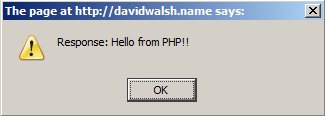Generate Readable Byte Labels Using PHP
Whenever you manage disk space, it's infinitely easier to read when when the bytes are displayed in KB, MB, GB... format. When reading files on the disk, the server returns the disk space in bytes so it's on us programmers to program file sizes for display. Using PHP, this task is cake.
function format_bytes($bytes)
{
$labels = array('B','KB','MB','GB','TB');
for($x = 0; $bytes >= 1024 && $x < (count($labels) - 1); $bytes /= 1024, $x++);
return(round($bytes, 2).' '.$labels[$x]);
}
Users will appreciate this!
![Detect DOM Node Insertions with JavaScript and CSS Animations]()
I work with an awesome cast of developers at Mozilla, and one of them in Daniel Buchner. Daniel's shared with me an awesome strategy for detecting when nodes have been injected into a parent node without using the deprecated DOM Events API.
![Serving Fonts from CDN]()
For maximum performance, we all know we must put our assets on CDN (another domain). Along with those assets are custom web fonts. Unfortunately custom web fonts via CDN (or any cross-domain font request) don't work in Firefox or Internet Explorer (correctly so, by spec) though...
![Basic AJAX Requests Using MooTools 1.2]()
AJAX has become a huge part of the modern web and that wont change in the foreseeable future. MooTools has made AJAX so simple that a rookie developer can get their dynamic pages working in no time.
Step 1: The XHTML
Here we define two links...
![MooTools Zebra Tables Plugin]()
Tabular data can oftentimes be boring, but it doesn't need to look that way! With a small MooTools class, I can make tabular data extremely easy to read by implementing "zebra" tables -- tables with alternating row background colors.
The CSS
The above CSS is extremely basic.





I always like using the right-shift operator for this kind of stuff. So instead of:
$bytes /= 1024
I would use:
$bytes >>= 10
Of course, you lost the digits after the decimal point (unless you get fancy), but on the plus side, it’s way faster than floating point division. The shift operators must be some of the loneliest operators in PHP, don’t you think?
Nice one!
I did a similar function … somewhat overkill, but a usefull thing over the years =)
http://openminds.lucido-media.de/human-readable-bytes-sorry-php-net